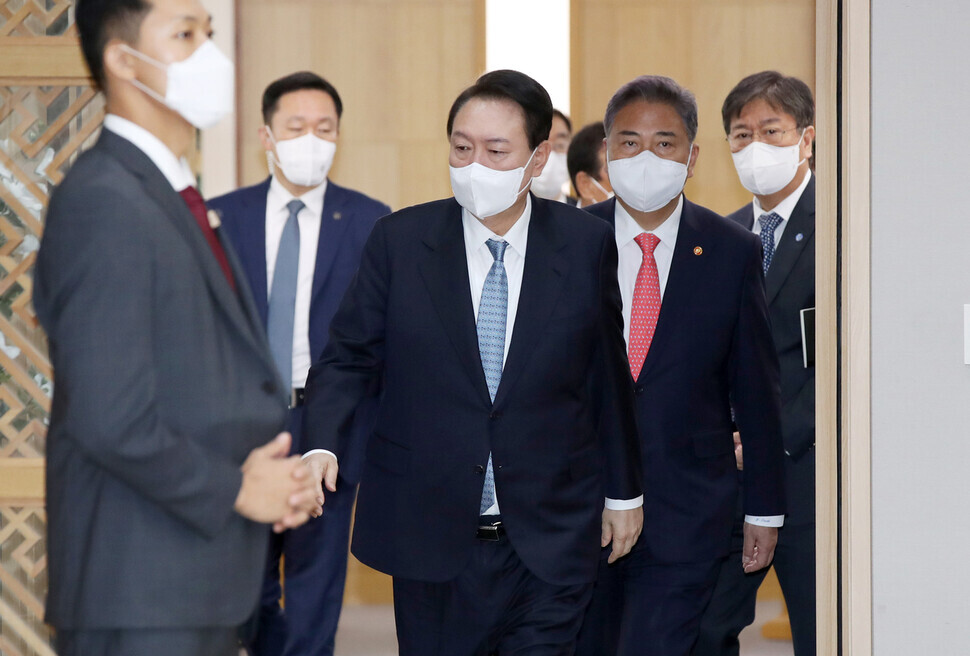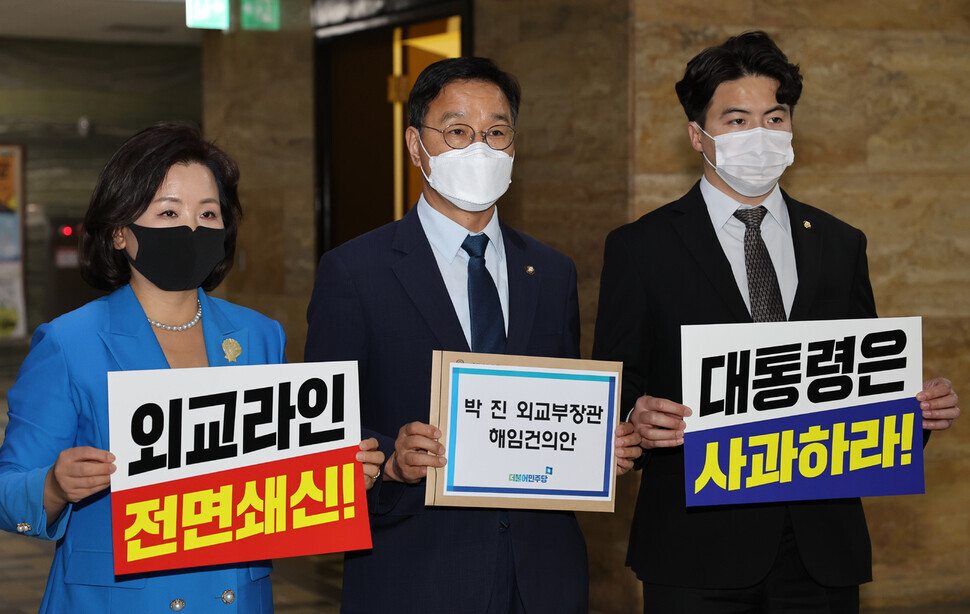hankyoreh
Links to other country sites 다른 나라 사이트 링크
National Assembly becomes battleground in controversy over Yoon’s diplomatic gaffes

It was revealed on Tuesday that following President Yoon Suk-yeol’s calls for an investigation into the reports of him making foul remarks, the presidential office had sent an official letter to MBC, the first to report on the incident, demanding that the broadcaster reveal the details behind its report.
The People Power Party (PPP) launched a task force for “revealing the truth regarding MBC’s biased broadcasting,” and, together with the presidential office, embarked on a two-pronged attack insinuating collusion between politicians and the media.
Meanwhile, the Democratic Party submitted a proposal to dismiss Foreign Minister Park Jin, holding him responsible for what it sees as a “diplomatic disaster” that transpired during Yoon’s overseas trip.
The presidential office sent an official letter under the name of the secretary for external cooperation to MBC on Monday in which it demanded that the broadcaster reveal the details of how Yoon’s remarks were reported, saying, “The alliance [with the US] has been damaged and the national interest has taken a severe blow.”
The same day, MBC released the full text of this combative letter sent by the presidential office.
The PPP continued its offensive as well, saying, “MBC, which was the first to report [on the president’s remarks], did not even observe the basic principle of reporting: fact-checking.” At a party caucus held Tuesday at the National Assembly, PPP floor leader Joo Ho-young criticized the broadcaster, saying, “Reporting on hearsay and inserting so-called rumors for subtitles is an act of shirking responsibility as a public broadcaster.” The party’s task force for the issue planned to visit MBC in protest on Wednesday.
In response to the ruling party’s accusations of collusion between the media and politicians, the Democratic Party proposed a motion in the name of all 169 of its lawmakers to dismiss Park from his post as foreign minister. The party’s strategy is to hold Park accountable in place of Yoon, despite seeing Yoon as chiefly responsible for the diplomatic fiasco.

In the proposal for Park’s dismissal, the Democrats said, “Minister Park should take stern responsibility as the minister in charge for President Yoon’s fruitless visit to the UK, the US and Canada, which ended in an unprecedented diplomatic disaster that damaged Korea’s national prestige and national interest.”
Visiting the National Assembly on the same day, Park told reporters, “It is truly regrettable that the opposition party is relying on its power as majority to make even diplomacy, the most important line of our national interest, a subject of political strife,” adding, “I will do my best to hold fast and fulfill my duties.”
Proposals for the dismissal of Cabinet members require more than one-third of incumbent National Assembly members to be introduced and a simple majority to pass, meaning that the Democrats are capable of passing the proposal to remove Park on their own. While dismissal is not legally binding even if the proposal is passed, it can be used as a means to pressure the president. In September 2016, the Democratic Party introduced a proposal to dismiss Minister of Agriculture, Food and Rural Affairs Kim Jae-soo, citing allegations of preferential treatment in leasing an apartment at a dirt cheap price and receiving ultra-low-interest loans, but then-President Park Geun-hye did not replace Kim.
The PPP called for the withdrawal of the proposal, describing it as a “boast of strength by a supermajority-holding opposition party and a threat to the government.” Joo met with reporters after the National Assembly meeting and said, “As the bill cannot be placed on the agenda if not agreed upon, we will request a consultation with National Assembly Speaker Kim Jin-pyo.” This can be seen as a demand to not bring the proposal before the National Assembly plenary session unless the ruling and opposition parties come to an agreement.
The proposal to dismiss Park, which was reported to the plenary session of the National Assembly on Tuesday, must be voted on by secret ballot beginning 24 hours after notification and within 72 hours. Therefore, if it does not make it on the agenda for the plenary session on Thursday, it will be automatically discarded.
The ruling Saenuri Party protested when Kim Jae-soo’s dismissal was proposed in 2016, but the then-serving National Assembly speaker, Chung Sye-kyun, pushed the proposal through. Kim Jin-pyo’s office told the Hankyoreh, “As the dismissal proposal has been motioned, we have recommended serious discussions between the ruling and opposition parties,” adding, “We are carefully considering the procedures and precedents of the National Assembly Act.”
By Joh Yun-yeong, staff reporter; Sun Dam-eun, staff reporter
Please direct questions or comments to [english@hani.co.kr]

Editorial・opinion
![[Column] Season 2 of special prosecutor probe may be coming to Korea soon [Column] Season 2 of special prosecutor probe may be coming to Korea soon](https://flexible.img.hani.co.kr/flexible/normal/500/300/imgdb/original/2024/0426/3317141030699447.jpg) [Column] Season 2 of special prosecutor probe may be coming to Korea soon
[Column] Season 2 of special prosecutor probe may be coming to Korea soon![[Column] Park Geun-hye déjà vu in Yoon Suk-yeol [Column] Park Geun-hye déjà vu in Yoon Suk-yeol](https://flexible.img.hani.co.kr/flexible/normal/500/300/imgdb/original/2024/0424/651713945113788.jpg) [Column] Park Geun-hye déjà vu in Yoon Suk-yeol
[Column] Park Geun-hye déjà vu in Yoon Suk-yeol- [Editorial] New weight of N. Korea’s nuclear threats makes dialogue all the more urgent
- [Guest essay] The real reason Korea’s new right wants to dub Rhee a founding father
- [Column] ‘Choson’: Is it time we start referring to N. Korea in its own terms?
- [Editorial] Japan’s rewriting of history with Korea has gone too far
- [Column] The president’s questionable capacity for dialogue
- [Column] Are chaebol firms just pizza pies for families to divvy up as they please?
- [Column] Has Korea, too, crossed the Rubicon on China?
- [Correspondent’s column] In Japan’s alliance with US, echoes of its past alliances with UK
Most viewed articles
- 1‘We must say no’: Seoul defense chief on Korean, USFK involvement in hypothetical Taiwan crisis
- 2Is Japan about to snatch control of Line messenger from Korea’s Naver?
- 3The dream K-drama boyfriend stealing hearts and screens in Japan
- 4Up-and-coming Indonesian group StarBe spills what it learned during K-pop training in Seoul
- 5S. Korea “monitoring developments” after report of secret Chinese police station in Seoul
- 6Division commander ordered troops to enter raging flood waters before Marine died, survivor says
- 7[Column] ‘Choson’: Is it time we start referring to N. Korea in its own terms?
- 8[Editorial] New weight of N. Korea’s nuclear threats makes dialogue all the more urgent
- 9Will NewJeans end up collateral damage in internal feud at K-pop juggernaut Hybe?
- 10‘Weddingflation’ breaks the bank for Korean couples-to-be